The meeting of WTO Ministers in Cancun/Mexico ended without reaching a consensus in September 2003. But this is not the end of the WTO. The general advisory board of the World Trade Organization is called up for December 2003 to work with the negotiated text of the conference as a discussion basis.
Key Issues for the 5 th WTO Round were Agriculture, especially market access and subsidies issues, and Development Issues - over three-quarters of WTO members are developing countries.
While the aims of the Doha negotiating round had not changed, the political and economic conditio ns in which the negotiations were taking place had changed enormously in the last year. This included a slowdown in the world economy, currency instability, g eopolitical differences, outstanding trade disputes, and the proliferation of bilateral and regional trade agreements. An agreement on agriculture would have been a precond ition for success for the round of WTO negotiations. Issues were the dismantling of export subsidies, the reduction or removal of market access restrictions that block imports or exports of agrifood products, harmonization of regulations and the reduction of regulatory barriers with respect to phytosanitary standards and genetically- modified organisms, and a re-definition of antidumping to reflect real costs of production (before and after subsidies) in all countries. Another key point of Cancun was the General Agreement on Trade in Services - GATS.
Before the round the developing countries called for the implementation of measures agreed under the last Uruguay round of negotiations: m arket access for agricultural and nonagricultural goods, as well as services, rules for governing special and differential treatment, procurement, and interdependence - the linkage of progress on trade negotiations with the resolution of other issues like agriculture and access to pharmaceuticals under TRIPS.
Inhaltsverzeichnis (Table of Contents)
- Executive Summary
- Table of Contents
- The WTO Minister Conference at Cancun
- What happened?
- The Way forward
- Preliminary Remarks
- Theory of Trade
- Economics
- Comparative Advantage
- The underlying Issues - before Cancun
- Political & Economic Challenges
- The Benefits of Market Liberalization
- Key Issues before Cancun
- Agriculture
- Services (General Agreement on Trade in Services - GATS).
- Developing Country Issues
- Market Access
- TRIPS
- New Rules
- Special & Differential Treatment
- What now
- A streamlined Agenda?
- References
Zielsetzung und Themenschwerpunkte (Objectives and Key Themes)
This paper examines the WTO Minister Conference in Cancun, Mexico in September 2003, which concluded without reaching a consensus. The paper analyzes the underlying issues that led to the failure of the conference, focusing on the challenges of agricultural trade, services trade, and the concerns of developing countries.
- The breakdown of the Cancun WTO Ministerial meeting and its implications for the future of the WTO.
- The role of agriculture in international trade negotiations and the challenges of reaching a consensus on agricultural trade barriers.
- The importance of services trade and the challenges of negotiating a comprehensive agreement on trade in services (GATS).
- The concerns of developing countries regarding market access, intellectual property rights (TRIPS), and special and differential treatment.
- The potential for a streamlined WTO agenda and the impact of the Singapore Issues on the negotiating process.
Zusammenfassung der Kapitel (Chapter Summaries)
The paper begins by outlining the failure of the Cancun WTO Ministerial meeting, examining the reasons for its collapse, including the failure to agree on the Singapore Issues and the challenges of negotiating agricultural trade barriers. The paper then delves into the broader context of the WTO negotiations, exploring the political and economic challenges facing the organization. It emphasizes the benefits of market liberalization and discusses key issues before Cancun, including agriculture, services, and developing country concerns.
The chapter on developing country issues examines the challenges of market access, the impact of the TRIPS agreement, the need for new rules, and the importance of special and differential treatment for developing nations. The paper concludes with a discussion of the potential for a streamlined WTO agenda and the future of the Doha Round.
Schlüsselwörter (Keywords)
The key terms and concepts explored in this paper include the WTO, Cancun, Doha Development Agenda, Agriculture, TRIPS, GATS, and Developing Countries. The paper focuses on the challenges of international trade negotiations, particularly regarding agricultural trade, services trade, and the concerns of developing nations. It also examines the potential for a streamlined WTO agenda and the future of the Doha Round.
Frequently Asked Questions
What happened at the WTO Ministerial Conference in Cancun in 2003?
The conference ended without a consensus, primarily due to disagreements over agricultural subsidies and the so-called "Singapore Issues."
What were the key issues regarding agriculture?
The main points of contention were market access, the dismantling of export subsidies, and the reduction of domestic support in developed nations.
What is the GATS agreement?
GATS stands for the General Agreement on Trade in Services, which aims at liberalizing international trade in services like banking, telecommunications, and transport.
Why were developing countries dissatisfied in Cancun?
Developing nations felt that the implementation of previous Uruguay Round measures was lacking, especially concerning market access for their goods and access to pharmaceuticals under TRIPS.
What is TRIPS?
TRIPS is the Agreement on Trade-Related Aspects of Intellectual Property Rights, which sets minimum standards for many forms of intellectual property regulation.
- Quote paper
- Christian Nitschke (Author), 2003, The WTO Round in Cancun, Munich, GRIN Verlag, https://www.grin.com/document/25028



